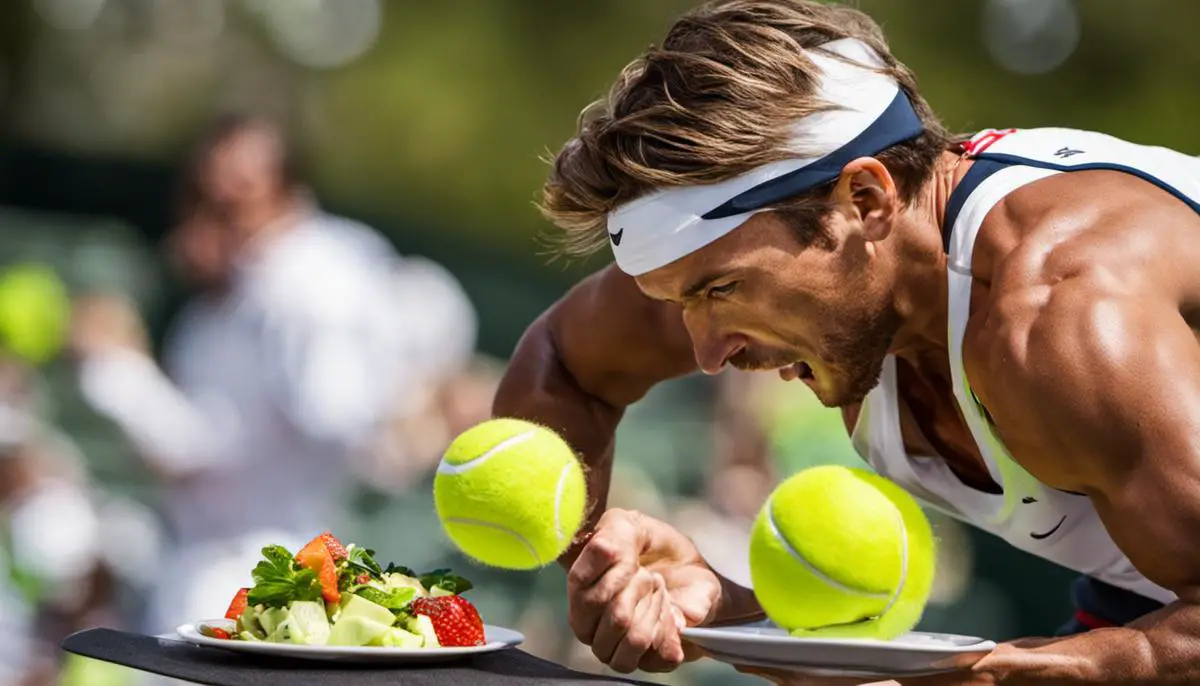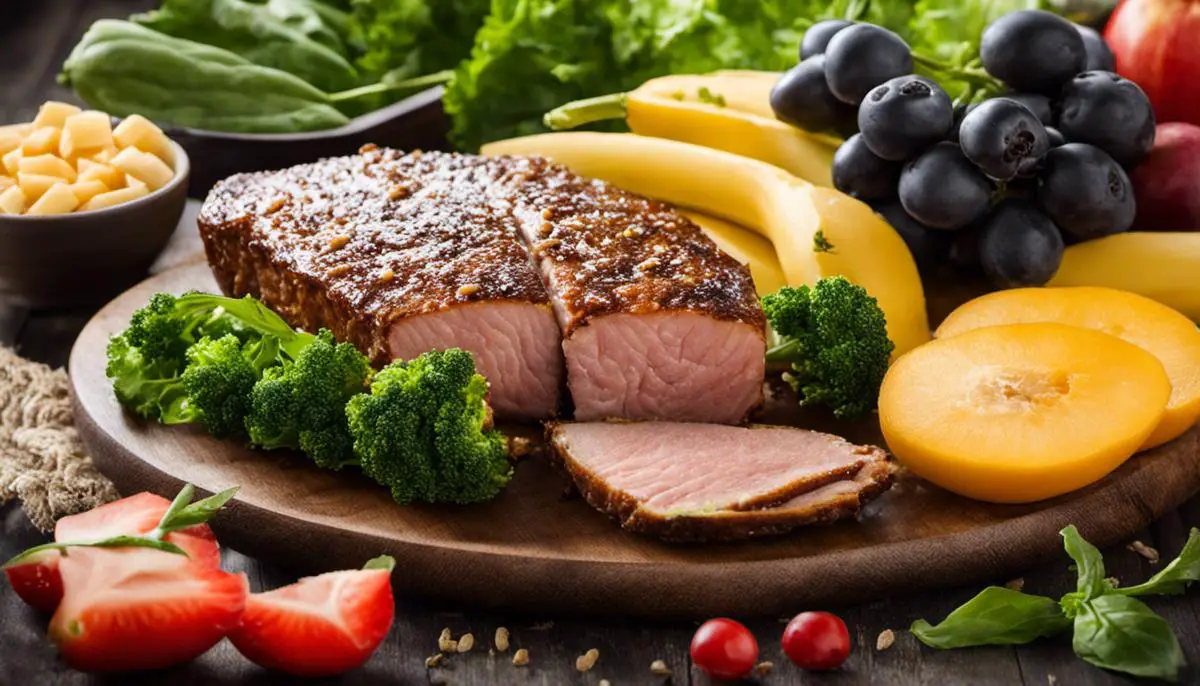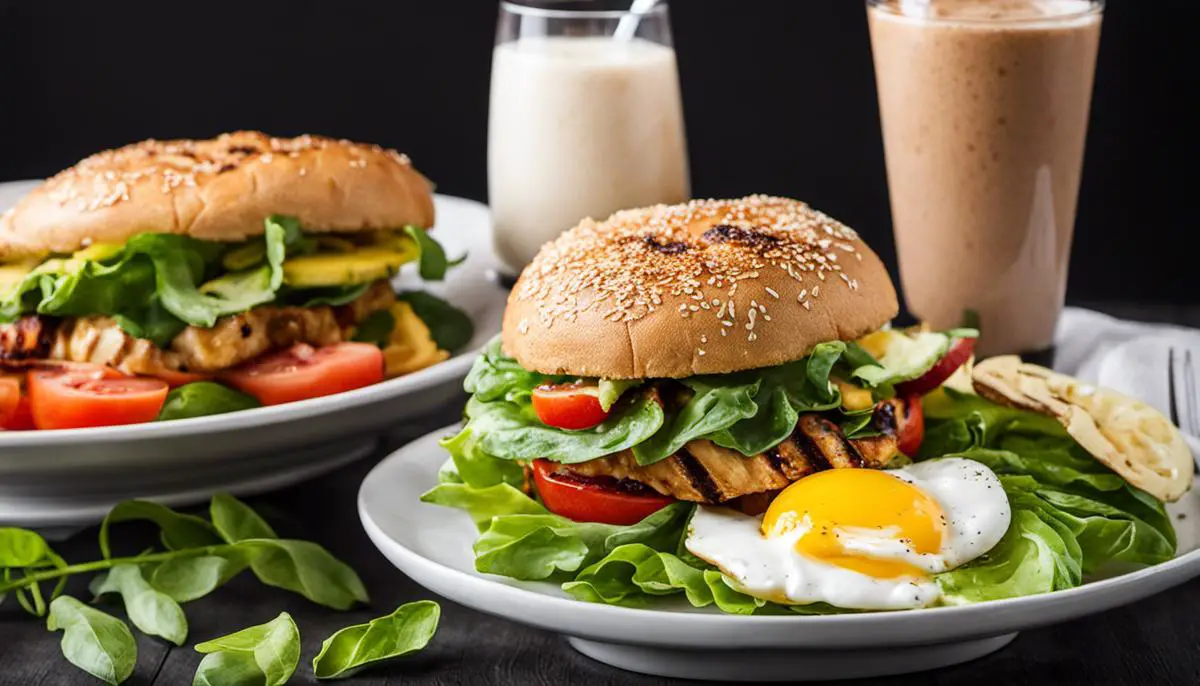With the physically demanding nature of tennis, it’s essential for players to maintain a nutritious diet that prioritizes protein. This valuable macronutrient, typically associated with muscle recovery and growth, plays a significant role in every tennis players’ performance and energy levels. Regrettably, it’s often overlooked in comparison to carbohydrates and fats. This text delves deep into the relationship between protein and tennis performance, providing insights into optimal protein intake, timing, and selection. It also offers practical protein-rich meal ideas, catering to the unique dietary needs of tennis players.
Understanding the Importance of Protein for Tennis Players
The Role of Protein in Muscle Recovery for Tennis Players
Muscle recovery is a crucial process for athletes, particularly those like tennis players who utilize explosive movements, agility, and endurance. Protein aids in this necessary recovery as it helps repair the microscopic muscular damage caused by rigorous activity. Consuming a sufficient amount of protein after a tennis match or training session provides the amino acids required by the body to repair muscle tissue and promote recovery.
Protein’s Impact on Muscle Growth and Maintenance
For tennis players in particular, strength is key. Protein plays a fundamental role in muscle growth and maintenance. When changes in protein synthesis and breakdown occur during training, the addition of protein in a diet facilitates muscle hypertrophy (growth). Providing a steady and adequate amount of protein throughout the day aids in maintaining muscle mass, vital for tennis players who need to maintain power in their shots.
Sustained Energy Supply through Protein
Tennis matches can last for several hours, making sustained energy crucial for top performance. While carbohydrates are the primary energy source for quick and explosive movements, protein can provide sustained energy. Additionally, it helps maintain blood sugar during long matches, reducing the risk of energy crash. Dietary protein proves useful during grueling practices and matches where it is necessary to sustain endurance.
Protein-Rich Meal Options for Tennis Players
Incorporating protein-rich meals into a tennis player’s diet can be achievable by adding a variety of food items. Lean meats such as chicken, turkey, and fish are excellent sources of protein. Other options include eggs, Greek yogurt, cottage cheese, and legumes. These foods provide essential amino acids that facilitate muscle recovery and growth.
Non-meat sources of protein, for those following vegetarian or vegan diets, include quinoa, lentils, chickpeas, and tempeh, alongside many protein-fortified plant-based items available in supermarkets.
For players on the go or looking for convenience, protein shakes can serve as a quick and efficient way to ingest the required protein. For instance, whey protein, rapidly absorbed by the body, is effective for muscle recovery and growth post training or match.
Meal Timing Importance
Timing the intake of protein is essential for tennis players. Consuming a protein-rich meal or snack within two hours post-activity can optimize muscle repair and growth. Overnight, the body continues to utilize protein for recovery and muscle protein synthesis. Therefore, a balanced dinner with a good amount of protein also supports optimal recovery.
Individualized Protein Requirements
Tennis players need varying amounts of protein depending on specific factors such as their age, gender, and the level of physical exertion they engage in. Generally, athletes should aim for consuming around 1.2 to 2 grams of protein per kilogram of their body weight every day. Consulting a registered dietitian or sports nutritionist can help determine the ideal protein intake and meal choices tailored to meet a tennis player’s unique nutritional needs and performance objectives.

The Connection of Protein Intake, Energy Levels, and Performance
Protein’s Importance in a Tennis Player’s Diet
In the nutrition regime of a tennis player, protein holds a critical position. Its role is to mend and strengthen muscles, which undergo regular stress during vigorous tennis matches and training schedules. A diet abundant in protein is excellent for not only aiding muscle recovery but also enhancing and preserving lean muscle mass. Moreover, protein contributes to maintaining stable blood sugar levels, thereby ensuring lasting energy. This eventually leads to sharper focus and improved overall performance on the court.
Correlation Between Protein Intake and Performance
Research indicates a strong correlation between adequate protein intake and athletic performance, especially in sports that demand both skill and endurance like tennis. Consuming protein-rich meals helps replenish the body’s protein stores, which can otherwise get depleted through physical exertion, resulting in muscle wasting. It essentially provides the amino acids that the body uses to repair and rebuild these broken down proteins, promoting new tissue growth.
Protein Timing in Relation to Performance
The timing of protein consumption is equally as significant as the amount of protein consumed. For optimal recovery and muscle tissue repair, it’s recommended that athletes, such as tennis players, consume protein within a two-hour window post-workout. This practice, often referred to as the anabolic window, has been linked to enhanced muscle recovery and growth. However, protein intake should also be distributed evenly throughout the day in multiple meals and should not be centered around one single meal.
Pre or Post Workout Protein Intake
There has been much debate about whether it’s more beneficial to consume protein before or after workouts. The reality is that both timings offer unique benefits. Pre-workout protein intake helps decrease muscle protein breakdown during the exercise. On the other hand, post-workout protein intake stimulates muscle protein synthesis and aids in recovery. Therefore, it is suggested that tennis players incorporate protein in both their pre and post-workout meals.
Protein-Rich Meal Suggestions for Tennis Players
Protein-rich meals for tennis players can be diverse and balanced. For a pre-workout meal, players can opt for lean protein sources like chicken or turkey breast, fish, or Greek yogurt combined with complex carbohydrates. This combination can help prevent protein breakdown during exercise and provide a steady energy release. Post-workout meals could include protein shakes or a meal comprised of lean protein and a good portion of carbohydrates for replenishing glycogen stores. Examples can be grilled salmon with quinoa or an omelet with avocado and whole-grain toast.
Maintaining Energy Levels with Protein
Maintaining stable energy levels is fundamental for tennis players who require both power and endurance. Regular consumption of protein-rich meals helps stabilize blood sugar levels, which can prevent energy slumps. Stable blood sugar levels help maintain a consistent energy supply, enhancing concentration levels, performance consistency, and overall stamina in the tennis court. Regularly feeding the body with the necessary protein can, therefore, ensure that the player stays energetic and performs at their best.
Understanding the Role of Protein for Tennis Players
For tennis players, protein is an indispensable nutrient for muscle recovery and providing sustained energy. However, it is not all about protein. Achieving a balance with other macronutrients, carbohydrates and fats, is equally vital. These are responsible for providing the energy that fuels demanding physical activities. The nutritional equation that ultimately leads to a better performance rests upon a balanced diet attuned to the unique requirements of the athlete’s regimen and physical strain. In addition to this, it’s also essential for athletes to remain adequately hydrated, which pairs well with a protein-rich diet.

Choosing the Right Proteins: Complete, Incomplete, and Complementary Proteins
The Importance of Complete and Incomplete Proteins
When it comes to protein sources, the quality is not the same across the board. Proteins can be thought of as a collection of amino acids, often referred to as the body’s building blocks. Out of the twenty amino acids, nine are essential, which means the body can’t produce them naturally and relies on our diet for supply.
This brings us to the concept of complete proteins versus incomplete proteins. Complete proteins have all nine essential amino acids in the right proportions. Common sources are animal-derived – such as meats, fish, dairy, and eggs. These could be optimal for tennis players as they provide all the necessary amino acids required for muscle tissue repair and energy boosts crucial in enduring physical exertion.
Incomplete proteins, on the other hand, miss one or more essential amino acids. They are predominantly plant-based, examples being beans, grains, and nuts. While they don’t supply all essential amino acids individually, they are still an invaluable part of a tennis player’s diet, especially for vegetarian or vegan athletes.
The Concept of Complementary Proteins
Creating a protein-rich diet for tennis players doesn’t mean relying solely on animal-based proteins. In fact, pairing different incomplete proteins can yield a complete protein profile. This concept of combining incomplete proteins to make a complete protein is called complementary proteins. The idea is to combine two or more food sources of incomplete proteins that, when eaten together, provide all nine essential amino acids.
For example, by combining grains and legumes (such as rice and beans), you can achieve a complete protein. Many traditional meals around the world already combine foods this way; think of Indian dahl with rice or a peanut butter sandwich on whole grain bread.
Benefits of Protein in a Tennis Player’s Diet
For athletes like tennis players who engage in high-intensity workouts, a diet rich in high-quality protein can provide numerous benefits. Protein is crucial for muscle repair and growth, producing hormones and enzymes, maintaining fluid and electrolyte balance, and providing energy.
Adequate protein intake helps reduce muscle soreness and fatigue after a tough match, making recovery more efficient. It also helps to increase muscle strength and mass, improving overall athletic performance.
Crafting Protein-Heavy Diets for Tennis Players
Designing a protein-dense diet for tennis players embraces a blend of both animal and plant-based proteins. The first meal of the day could consist of Greek yogurt embellished with a selection of fruits and nuts. For the midday meal, a chicken or tofu salad loaded with assorted vegetables is an excellent option. When evening rolls in, consider having lean steak or salmon, paired with quinoa and steamed vegetables.
When it comes to snacks, choose options rich in protein like a serving of hummus with whole grain crackers, or go for a whey protein shake. A diet like this not only adheres to the suggested protein consumption for athletes, which is between 1.2 to 2.0 grams of protein per kilogram of body weight, but it also balances other essential nutrients including carbohydrates and fats, contributing to overall health and improved performance.

Protein-rich Meal Ideas for Tennis Players
Protein-Filled Breakfast Recommendations for Tennis Players
Morning meals are especially important for tennis players as they not only replenish the body after a long rest but also lay the groundwork for the day’s energy requirements. Choosing lean, high-quality proteins for breakfast would be ideal. Scrambled eggs or an egg white omelette are exemplary protein-rich breakfast choices. Add spinach, tomatoes, and low-fat cheese to enhance taste and nutritional value. You could also try protein-loaded Greek yogurt, generously topped with a variety of nuts and berries as a quick yet nutritious fix. To cater to your carbohydrate needs for sustained energy levels, do not forget a slice of whole-grain bread.
Lunch Ideas: Protein + Carbs
For lunch, tennis players need a meal that can provide sustenance for afternoon training sessions or matches. A chicken or turkey sandwich on whole grain bread with a side of veggies is a solid choice. If looking for a salad option, consider a grilled chicken or salmon salad with leafy greens and quinoa. This offers a rich protein and carb combination which provides long-lasting energy.
Dinner Options High in Protein
Protein should also be prioritized in a tennis player’s dinner, but it should be lean to ensure easy digestion and optimal recovery as the body rests. Grilled chicken or turkey with sweet potatoes or a lean steak with brown rice or quinoa are splendid choices. Alternate protein sources like tofu or tempeh can be added to stir-frying vegetables for vegetarian tennis players. Fish like salmon or tuna are also excellent protein options as they provide necessary omega-3 fatty acids.
Snacking for Protein Intake
When tennis players need a quick snack between meals or matches, protein is very important to restore energy levels and help muscle recovery. Snacking on a few hard-boiled eggs, Greek yogurt, or a protein bar can be beneficial. Nuts or trail mix, and even a whey protein shake can also be excellent choices to maintain a steady intake of protein throughout the day.
Pre-Match Meals
Before a match, athletes require a high protein meal that’s also rich in carbohydrates to keep energy levels sustained. A good example is a chicken pasta dish, providing a balance of protein and carbs. Alternatively, a protein smoothie made with Greek yogurt, frozen banana, and a scoop of protein powder can be a quick, digestible meal that won’t sit heavy in the stomach during a match.
Post-Match Meal Ideas
After a match or strenuous training session, immediately refueling with a protein-rich meal is critical. This assists in muscle repair and growth. A protein shake is the easiest and quickest way to replenish the body. Within an hour or two, eating a balanced meal with a good amount of protein can also be helpful. This might include grilled chicken with vegetables and a side of quinoa, or a protein-packed stir-fry with whole grains.
Incorporating protein-rich meals into a tennis player’s diet is an essential part of their physical endurance and recovery. These meal ideas offer versatile ways to include protein at various points throughout the day.

Protein, as we’ve discussed, is not just ‘important’ but critical for tennis players’ performance and recovery. The intentional selection, timing, and consumption of complete or complementary proteins can significantly impact a player’s energy levels and on-court performance. Moreover, with the provided protein-rich meal ideas, players can easily incorporate these nutritional powerhouses into their everyday meals. Therefore, an understanding and implementation of the recommended protein practices can be the game-changer in a tennis player’s dietary routine, helping them stay a step ahead of their competition.